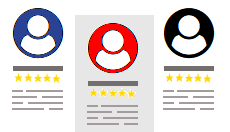|
Children
Children whose mother tongue is not German need specific preparation for everyday school life. First of all, a basic vocabulary on various everyday topics must be built up. The topics must correspond to the interests and experiences of the children. At the same time, the children learn the letters and sounds which they combine to form syllables and words. Finally, word and text comprehension must be trained. In a playful, visual and motivating way, the four skills of listening, languages, reading and writing are trained and developed according to the CEFR. |
|
|
Young people (Youths – Youngsters)
Young people whose mother tongue is not German, but who have already been alphabetized in their mother tongue, are duplicative learners. Although they have to acquire the German writing system anew, they can both make comparisons with their mother tongue and transfer learning techniques. Reading and writing are practised at a low level, while at the same time grammatical awareness is developed. Using concrete communication situations and text templates, the four skills of listening, speaking, reading and writing are trained according to the CEFR. |
|
|
Adults
Adults whose mother tongue is not German, but who have not been alphabetized in their mother tongue either, require a general basic education. Starting with the development of motor skills, through the acquisition of phonological awareness to the development of concentration, primary illiterates go through a long learning process. According to Uta Frith, the following learning phases of written language acquisition must be identified: the Logographic Phase, the Alphabetical Strategy and the Orthographic Phase. |
| If you are also interested in the services of the Eureka Academy, please contact us and let us advise you without obligation. |


 DE
DE 
